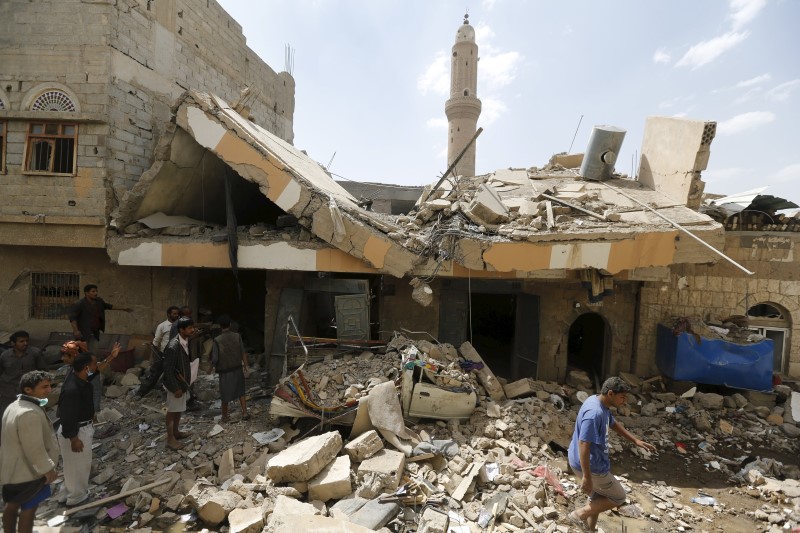SANAA (Reuters) - Air strikes by a Saudi-led coalition killed 50 people in Yemen when they hit a Houthi-held security compound in the north and a house in Sanaa, medical sources and officials said, in an escalating campaign that has claimed increasing civilian lives.
Gulf Arab forces and supporters of exiled President Abd-Rabbu Mansour Hadi, meanwhile, appear to be making scant progress in a ground offensive in the central desert against battle-hardened Houthi forces who control the capital Sanaa some 120 km (75 miles) to the west.
The coalition intervened in Yemen in March to restore Hadi after he fled to Saudi Arabia when the Houthis, backed by supporters of former president Ali Abdullah Saleh, overran his southern stronghold of Aden.
A coalition jet fired a missile on Monday into police headquarters in the al-Shaghadreh district of the northern province of Hajjah, northwest of Sanaa, that is in the hands of the Iranian-allied Houthis, regional officials said.
A second missile crashed at the compound as rescue teams and residents arrived, causing a large number of casualties including at least 30 dead, according to medics on the scene.
Earlier in the day, coalition warplanes bombed a cement factory at Ibs, another Hajjah district. Local officials said the strike happened before workers arrived for work, but three shepherds who happened to be tending flocks nearby died.
In Sanaa, residents and medics said at least 18 members of one family were killed when a missile fired by a plane struck their house in al-Hasabah district of the capital. Neighbours said the missiles was apparently aimed at an adjacent residence occupied by members of the Houthi group.
Two more people died in another strike on a third house in the same area, rescuers said.
In the central city of Taiz, residents said eight people were killed in a mortar attack by the Houthis against a district of the city held by Hadi supporters, residents said.
ESCALATION
Almost daily air raids by Saudi-led forces have escalated since the Houthis fired a land-to-land missile at a coalition base in central Marib province two weeks ago, killing more than 60 soldiers, most of them from the United Arab Emirates (UAE).
The UAE pledged to push ahead with the coalition offensive to dislodge the Houthis - seen by U.S.-allied Gulf Sunni Muslim as a proxy for would-be Iranian expansion in the Arabian Peninsula - from Sanaa. The Houthis deny such links and say they are waging war against corruption and misrule in Yemen.
International human rights groups have voiced concern at the growing number of civilians killed in the intensifying air war.
Coalition officials said a major westwards thrust against the Houthis in oil-producing Marib began last week, and local media have since reported advances in the region.
A regional official in Marib said on Monday that the battlefronts had been quiet since the Arab coalition spearheaded by UAE forces completed "securing" the environs of Marib city.
On Sunday, an air strike targeted a market in the Mnabbeh district of the northern province of Saada, the historical Houthi bastion, killing at least 20 people and injuring over 70.
More than 4,500 people have been killed since the Saudi-led intervention, according to United Nations figures.
On Saturday, Oman said it had summoned the Saudi ambassador to Muscat to file a formal complaint over what it said was the targeting of the residence of its ambassador in Sanaa during air strikes on Friday night. Oman has not joined its Gulf Arab states in the anti-Houthi offensives.

A coalition spokesman denied the accusation and suggested that the envoy's residence may have been hit by mortars, possibly fired by the Houthis, the Saudi-owned Asharq al-Awsat newspaper reported on Sunday.